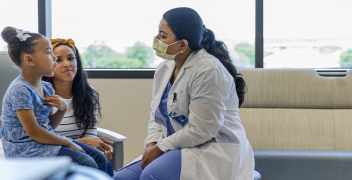Partnership With Christian Street YMCA
As a trusted gathering site that serves and is staffed primarily by community members, the Christian Street YMCA is well-positioned to provide trauma-informed support and care for Philadelphia community members, especially children and adolescents.
CVP researchers were introduced to Ronna Kassel, executive director of the Christian Street YMCA, in fall 2019 during Community-Driven Research Day (CDRD). Since then, CVP and the YMCA have worked toward the mutual goal of creating and sustaining resilient communities. This community partnership has helped build on the strengths of the YMCA, its staff, members, and the surrounding neighborhood and has resulted in programming and resources to address trauma and violence. To date, our community-academic research team has partnered on two research projects.
Healthy Bodies and Healthy Minds
With funding from a one-year CDRD grant, the YMCA-CHOP team partnered on developing and piloting the Healthy Bodies Healthy Minds project. Our teams co-designed and implemented trauma-informed care training for summer camp counselors and a brief series of educational activities to build emotional awareness and coping skills to address stress and trauma among summer campers at the YMCA.
We first implemented this training and camp activities in summer 2021, evaluating their impact using surveys before and after the YMCA staff training to measure changes in knowledge and self-efficacy in implementing trauma-informed practices. We also collected feedback from YMCA staff about their experiences conducting the camp activities through surveys, interviews, and team meetings to assess the relevance, acceptability, and feasibility of the camp curriculum. This feedback was integral to refining both the training and camp activities to make them more relevant and to enhance engagement.
Accomplishments
- Following a brief training, summer camp staff reported increased knowledge of how to apply trauma-informed practices in their work with young people.
- Camp staff reported that the activities were easy to follow with a high degree of comfort using the provided activity materials. Our project team enhanced the activities prior to summer 2022, in response to staff feedback and recommendations.
- YMCA staff continued to integrate the summer camp activities more broadly into both youth and staff programming during the summer of 2023. Staff shared that they feel comfortable employing the skills developed.
Defining and Implementing Trauma-Informed Practices
As a continuation of our collaboration built during the Healthy Bodies, Healthy Minds project, members of the YMCA leadership team were interested in learning more about how to support staff members in implementing trauma-informed practices across the YMCA. This interest led our partnership to a second project, Defining and Implementing Trauma-Informed Approaches, funded by a two-year grant from PolicyLab’s Community Partnerships in Research Program. Although awareness of the importance of trauma-informed practices is common in medical and mental health fields, there is an urgent need to understand what it means to implement these practices in community-based programs.
With that goal, our YMCA-CHOP team is working to enhance competence and confidence among YMCA staff to deliver community-based programming in trauma-informed ways. We also are learning more about what resources and supports are needed to prepare and sustain staff in using trauma-informed practices in their work.
With an eye toward ensuring project data and findings are valid and meaningful to the YMCA community, a key component underlying the project methodology is community engagement. Our team includes not only YMCA and CVP research leaders, but also staff with expertise and lived experience working with the YMCA community. These team members attend project meetings, co-create data collection tools and analytic frameworks, and are critical voices in interpreting findings and identifying practical solutions for supporting the YMCA’s already robust trauma-informed culture.
We believe results from this project will interrupt existing divides between academic and community entities surrounding trauma-informed practices and may provide lessons and strategies that can be replicated across the YMCA network of sites.




